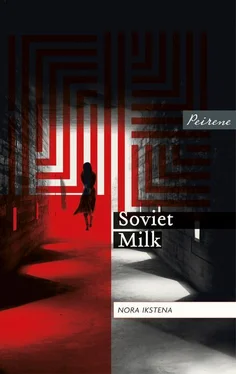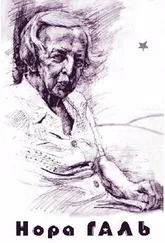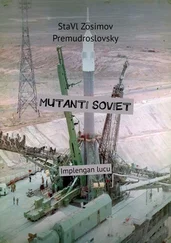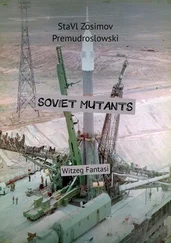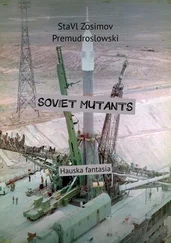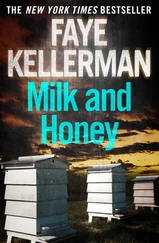We stopped at the brow of the hill. Below us was a small, steep slope, edged with protecting trees. It shone in the white moonlight.
‘Look how beautifully the heavenly bodies shine!’ said my daughter.
Over the river the sky was full of stars. And plumb in the middle gazed the round face of the moon.
Behind us stretched the line of my daughter’s footprints, by which I had climbed up the hill. In front lay a virgin, snow-clad field.
*
It was a school holiday. Everyone was preparing for the jubilee of the Great October Socialist Revolution, which of course nowadays is celebrated in November. That year November had arrived almost unnoticed. I wasn’t able to visit my grandmother and step-grandfather that autumn break. My mother wasn’t feeling well. She only just managed to keep going to work at the ambulatory centre. In the evenings she would be asleep early. All the household chores fell to me. No matter how much I yearned for my grandparents, I would not leave my mother by herself. I had washed and ironed my own white blouse, but I was worried about the hole in my red pioneer neckerchief: it was too small to be mended but still noticeable. I decided to tuck the neckerchief into my blue vest, as if unintentionally. And in the solemn student council line I took care never to stand in the front row. The main thing was to salute properly and yell clearly, ‘Vienmēr gatavs!’ – ‘Always ready!’ And never to forget this rallying song:
Kreiso, kreiso,
Kreiso, kreiso!
Pašā Rīgas vidū
Piemineklis stalts.
Granīts brūni sarkans,
Ļeņins bronzā kalts.
Kreiso, kreiso,
Kreiso, kreiso!
Left, left,
Left, left!
In Riga’s very centre
A stately monument.
In granite brownish red,
Lenin in bronze is forged.
Left, left,
Left, left!
That morning, my mother sat on the edge of her bed, rummaging through her handbag, looking for her tablets. Sometimes I would help her, picking them out of the lining. This time I couldn’t find anything, so we hunted for them together. My mother looked so helpless. I brewed a strong coffee for her, hoping that it would help. With a large mug of coffee and her first cigarette, my mother revived. She shooed me out to school so I wouldn’t be late.
All the female teachers had voluminous backcombed hairdos. They had dressed up in suits and high heels. Outside, the school flew our great motherland’s flag. We sang the hymn. The first verse was my favourite:
We’ve gained freedom for this land most dear.
Generation after generation born happy we’ll be.
Here our sea soughs, our tilled fields flower.
Here our cities shine, here Riga resounds.
And the refrain, in which the singers dwelt passionately on the first word:
So–o–oviet Latvia, may she live for ever.
May she brightly in the Soviet wreath shine.
I didn’t understand the next verse, which proclaimed our comradeship with the sublime Russian nation, which would conquer our enemies. Who were our enemies?
The third verse and refrain completed the hymn. Mechanically, I fulfilled all the required actions. I sang along with the others, but I was thinking only of my mother. I was filled with foreboding.
I remembered the drawing that my mother had made in our city flat with me sitting in her lap.
The mother with her baby, united by an umbilical cord and their mutual happiness.
There was no joy here. I was counting the seconds to when this solemn parade with all its rallying cries and songs would be over. When it was, I would pull on my coat and hurry home. Then maybe a miracle would happen and everything would be OK. My mother would be at work, or maybe at home and waiting for me with roast chicken and apple cake.
Kreiso, kreiso!
Vienmēr gatavs!
Brīvi!
Left, left!
Always ready!
At ease!
Finally! Once out of the auditorium, I raced like the wind to my locker in the corridor, pulled on my coat and rushed home.
My mother was lying in bed as white as a sheet. I couldn’t feel her breath. I pressed on her heart with both hands and blew my breath into her mouth. That’s what we were taught in school with a blown-up rubber doll.
Kreiso, kreiso! ’ I cried out, through my tears, and went on trying to breathe for her.
Suddenly my mother wheezed deeply, and under my hands I felt her heart violently begin to beat again. The wheezes subsided into fairly steady breathing. I threw back the blanket, since she seemed desperate for air. The linen was wet beneath her. I had to change her clothes and the sheet in a hurry, so she wouldn’t catch cold. And I had to fire up the wood stove.
*
This was deeper than sleep, deeper than dreams. It was as if I were gliding through scenes from my life. My mother was ironing a school apron. My stepfather was making paper covers for my notebooks. Suddenly my daughter was wading through a snow-covered field, and I wanted to follow in her footsteps, but I was always too late and missed them. Then my father was cutting down the stand of saplings, and I wanted to run to him, to tell him to come to his senses, but I couldn’t, because it seemed I had no legs.
Serafima appeared in the white light. She was naked and beautiful. Her skin was smooth and glowing, her breasts were supple and round, her legs slim, covered with a light, white down. She was so appealing, so yielding. I went to her and kissed the tiny hollow in her neck. My sense of smell was as acute as a dog’s. I was hypersensitive, as if overheated in the sun. Serafima responded to my kiss, she touched my breasts, they tensed and yielded to her hands. Serafima’s hands were cool and slid easily over my shoulders, arms and thighs. She unwrapped the shawl in which for some reason I had been wound. I was a cocoon, seeing in front of me a beautiful, splendid butterfly – Serafima.
She had half-uncovered me, and I felt a coolness. She embraced me, and suddenly from her flesh to mine flowed a tender wave of warmth. It seemed to wind around me more closely than the shawl. I heard my own heart and pulse, but maybe it was Serafima’s pulse. The two beats mingled together. Gratefully, I dropped to my knees and embraced her smooth legs.
There was neither suffering nor hardship. Life, with all its pitiful daily burdens, was somewhere far behind. Was this dying? Such a sensation of happiness, granted to compensate for all the torment on earth. I wanted this moment to last for ever – the pulse at my temple against Serafima’s legs. But someone with unbelievable strength was pulling me away from her. I couldn’t resist. And Serafima didn’t help me. She stood there splendid and unmoving. But I hung on tightly, ever so tightly, to her knees, her calves, her ankles, her toes, until she slid out of my grasp, because I hadn’t the strength to resist. I slipped away from her. Serafima was left in the white light with my shawl in her hands. Life’s quagmire drew me back.
*
My mother got well quickly. For about a week a nurse from the ambulatory centre came to our house and gave her an injection. Each time the nurse came she sighed profoundly, saying to my mother that she should get on her feet soon because her patients were continually asking for her. My mother’s consulting room was full of sweets and flowers. Should she bring them here for her? ‘No,’ said my mother. ‘Divide them among our colleagues.’
Читать дальше
